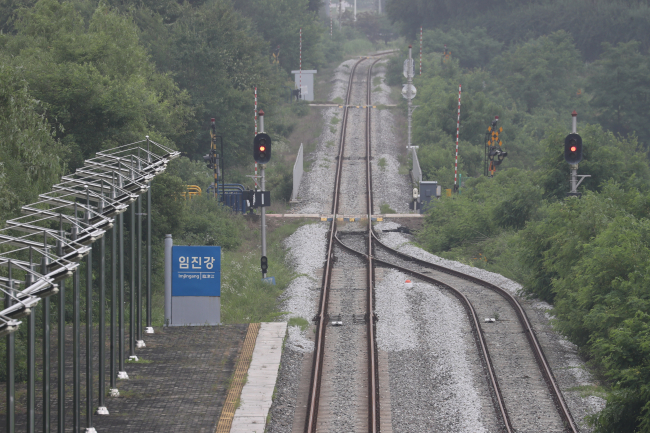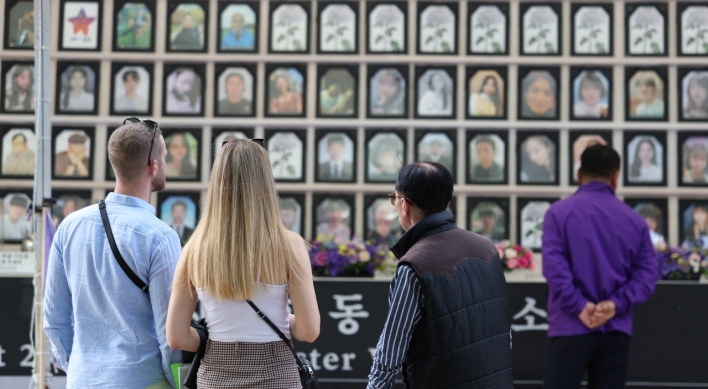UNC rejects two Koreas’ request to test-run cross-border railway
By Jung Min-kyungPublished : Aug. 30, 2018 - 13:12
The United Nations Command declined the two Koreas’ request to test-run a train on a cross-border railway last week, sources said Thursday, fueling speculation that the US might be reluctant to support inter-Korean projects amid stalled denuclearization talks with North Korea.
A test operation of a train connecting the South’s capital of Seoul to the North’s Shinuiju, which lies on the border with China, was initially planned for Aug. 22-27 as part of the Koreas’ joint field survey on modernizing cross-border railways, according to the Unification Ministry.
However, the US-led UNC did not greenlight the plans for Seoul officials and the train to cross the military demarcation line within the Demilitarized Zone, due to what sources believe to be Seoul’s failure to meet the guideline of providing notification 48 hours in advance.

“In coordination with the ROK (South Korean) government, the UN Command respectfully declined the Aug. 23 request for government officials to visit to North Korea through Transportation Corridor-West while requesting more fidelity on the details of the proposed visit,” the UNC, which oversees the cease-fire that ended the 1950-53 Korean War and activities within the DMZ, said in a text message sent to reporters Thursday.
A Unification Ministry official, under the customary condition of anonymity, told a group of reporters that the 48-hour rule was not the main issue behind the UNC’s decision, without elaborating. The official also declined to explain what the UNC meant by “the details of the proposed visit.” On the discrepancy of the dates, the Unification Ministry said that Aug. 22 was the correct date and that the UN Command had made an error in its message.
“We are closely consulting with the North and the US,” the official added.
Seoul’s Foreign Ministry said the South will continue to pursue the railway project within the frame of international sanctions against the communist nation.
Amid the ambiguity surrounding the UNC’s decision, experts noted that the UNC had been flexible with the 48-hour rule on previous occasions.
“The US is trying to pressure North Korea into making progress in denuclearization talks, but certain developments in inter-Korean relations that are not in tandem with the progress in talks could distract their goal,” said Kim Joon-hyung, an international studies professor at Handong Global University.
Despite North Korea’s recent calls for the South to take inter-Korean affairs into its own hands, the US has repeatedly stressed that inter-Korean ties must advance in lockstep with progress on denuclearization.
“It would be an overstatement to say that the US is trying to break apart the South-North relations, but it is a message that it is not comfortable with the current situation, knowing that the North has been reportedly violating sanctions,” the Seoul-based expert added.
The two Koreas are said to be in talks to arrange new meetings for some time after Sept. 9, the North’s founding anniversary.
The opening of a joint liaison office is another matter that appears to be facing similar obstacles.
The office was initially to be launched in the North’s border town of Kaesong by the end of August as part of efforts to foster smoother cross-border contacts, but the opening was delayed over what was believed to be US officials’ concerns about possible sanctions violations.
“(The South’s) supply of all materials, equipment, and energy is for the convenience of our officials and operation of the office, so we believe (the office) does not undermine the purpose of the sanctions as it does not offer economic benefit to North Korea,” Foreign Ministry spokesman Noh Kyu-duk said during a regular briefing.
By Jung Min-kyung (mkjung@heraldcorp.com)







![[Music in drama] Rekindle a love that slipped through your fingers](http://res.heraldm.com/phpwas/restmb_idxmake.php?idx=644&simg=/content/image/2024/05/01/20240501050484_0.jpg&u=20240501151646)



![[New faces of Assembly] Architect behind ‘audacious initiative’ believes in denuclearized North Korea](http://res.heraldm.com/phpwas/restmb_idxmake.php?idx=644&simg=/content/image/2024/05/01/20240501050627_0.jpg&u=20240502093000)







